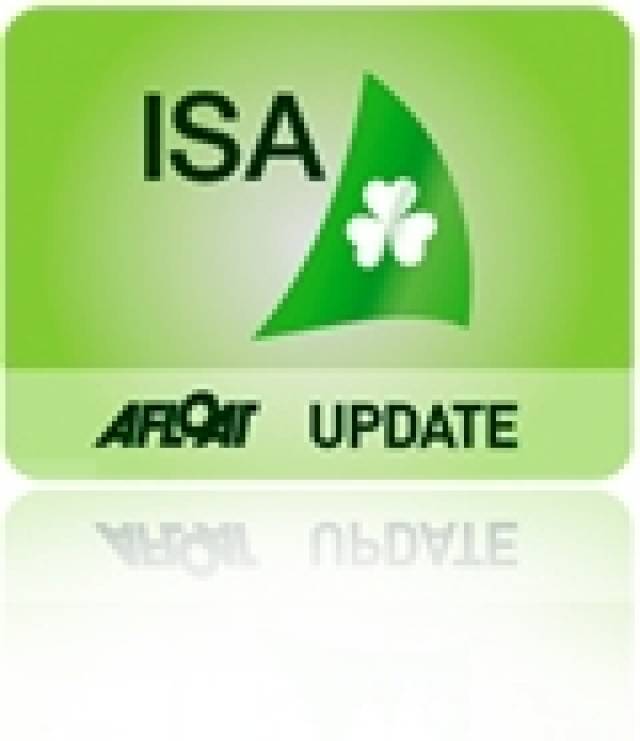#Dinghy - The big discussion on the fate of small boat sailing will have to wait another few weeks, with the deferment of the Irish Sailing Association's (ISA) Dinghy & One Design Keelboats Convention till 30 November at the earliest.
But the delay will be worth it if it means getting all the key figures in place for these necessary talks on plotting a new course for small boat sailing in Ireland.
It's undoubtedly a big task, attested by the highly charged classes forum in March this year that produced more than 300 suggestions for changes in the way the ISA handles small boat sailing.
That forum, which itself followed some intense discussion on Afloat.ie, prompted the ISA to publish a number of recommendations - among them its conclusion that the move away from using the voluntary support of small boat sailing clubs towards a stricter organisational regimen in the 1998 strategic plan has been significant in the "perceived disengagement of the membership from the operations of the ISA".
In the wake of those recommendations, Dublin-based sportboat sailor Ric Morris contributed his own list of things the ISA could do to rejuvenate Irish dinghy sailing.
Among them was the formation of an 'Irish Dinghy Racing Association' that would ensure smaller club's interests aren't dwarfed by the bigger, elite sailing classes; making club fleet sailing - and club class captains - the heart of every club; and even offering group purchasing schemes to lower the cost of both entry to the sport and sustaining club sailing.
Cost is indeed a major issue, as events administrated by national bodies cost money - more than what many are willing to pay, as the fall in participation levels demonstrates, according to former ISA president Roger Bannon, who also points out creeping costs even outside of the big competitions, from new recruits being persuaded to purchase expensive new boats when second-hand vessels would do, and the expense in acquiring instructor qualifications at club level.
On top of that is what Bannon perceives as a blinkered focus on single-handed classes with elite-level potential like the Laser and Optimist "almost to the exclusion of multi-crewed alternatives" which has had the result "of not equipping youngsters with the basic skills of sailing in a team environment" - a contrast to Britain, where the RYA throws big support behind economical classes like the Topper and Mirror.
Bannon followed up those thoughts more recently with figures from the last two years of class championships for dinghies and keelboats, which for him show that the small boat sailing scene in Ireland "is clearly on its knees".
Yet even for strong critics of the handling of Irish dinghy sailing, there's some good news to savour.
Looking at the figures for 2013 provided to him by Roger Bannon, Ric Morris points out that the RS400 and multihulls "now reach the standard suggested for a National Class" while RS200 numbers are on the rise, and GP14s have had a "bumper year with 50 boats at their nationals" and a Worlds event on Strangford Lough in August 2014.
The new Moth Class, which sees its Irish Open in Howth this weekend, also spells good fortune for small boat sailing in a country where adult dinghies make up 32% of all boats and nearly half of all sailors competing in small boat title events.
And youth sailing is taking up the slack, with 68 boats - the majority of them Irish - fielding at the Mirror Worlds on Lough Derg.
All of this must of course be seen in light of the decline in day boats, says Morris, from the SB20, which "no longer has a club presence outside of Dublin Bay", to the Flying Fifteen, with only one club fleet in Ireland, while the Etchells "look to have died altogether".
However, it can't be ignored that the first two of these classes at least still have healthy traveler series, and the Flying Fifteen was represented by an impressive 30 boats at the class Nationals this year.
What nearly everyone agrees on is as Norman Lee comments: that the long-term decline in numbers is undeniable and must be reversed. And the key to that may well be putting sailing back in the hands of sailors, not bureaucracy.
There's sense to the notion that top-down management of sailing classes ensures consistency in training and abilities to help develop elite-ready competitors, but perhaps some types of sailing were never meant to be handled that way.
As Ric Morris comments again, we shouldn't "expect to create world class sailors from the domestic small boat environment. That's the High Performance team's problem.
"The idea of producing elite sailors from the domestic sailing scene was killed off in the mid '90s," he adds. "Elite sailors now come from sailing against other prospective elite sailors. That's a good thing. It means there should be no pretense over what needs to be done."
What's your take on the situation? Share your thoughts in the comments below.
































































